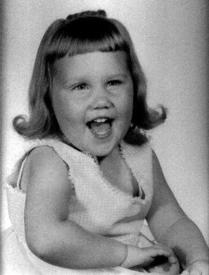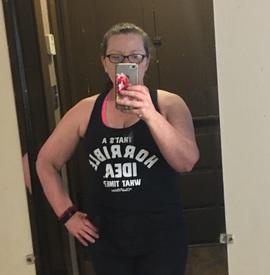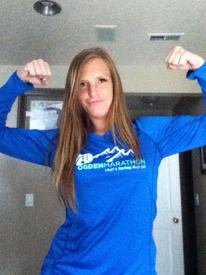DO NOT EAT BACK EXERCISE CALORIES!!!!!
Replies
-
when I lost the first 89lbs, I did it on zero exercise & still had a terrible diet but I ate a lot less cals than before so the weight came off. I eventually stopped losing & started gaining in Jan this year... my body had hit it's wall. Without eating a more balanced healthier diet & without exercise nothing was going to happen. I no longer had the leg room for a huge deficit so now have to stay within my allowance or else I wont lose.
As I work out 4-5 times a week & burn 500-600 cals per workout, I have to give something back. My body has to have it's fuel. Shame I didn't find this site 4 years ago as I would probably be at my target weight now but never mind, I sussed it out now0 -
THANKS, BUT I'VE LOST 25 POUNDS EATING BACK MY EXERCISE CALORIES SO I'M GONNA KEEP DOING IT.
And please don't yell. :flowerforyou:0 -
I'm not sure why the OP is yelling at us.

If you aim for 1200 calories a day, do a half hour of moderate cardio exercise, burn 200 calories, and eat them back, that's THE SAME as eating 1400 calories and not eating calories back.
It's the same math. It all depends on when you add the deficit and when you add the activity level. The dietitian is taking into consideration what you'll burn through exercise before you do it. MFP just waits until you have done it.
The only difference is that if you hit snooze one too many times, or get home from work too late, and don't do any exercise, you'll still lose at the same rate following MFP's calculations.
What LorinaLynne said. 0
0 -
I'm not sure why the OP is yelling at us.

If you aim for 1200 calories a day, do a half hour of moderate cardio exercise, burn 200 calories, and eat them back, that's THE SAME as eating 1400 calories and not eating calories back.
It's the same math. It all depends on when you add the deficit and when you add the activity level. The dietitian is taking into consideration what you'll burn through exercise before you do it. MFP just waits until you have done it.
The only difference is that if you hit snooze one too many times, or get home from work too late, and don't do any exercise, you'll still lose at the same rate following MFP's calculations.
Agreed.0 -
I just want to explain a couple of things about training for doctors, dietitians, and the basis for standard recommendations. Typically speaking, doctors do not have any education on exercise and nutrition. At most they may have taken a single basic nutrition class. Dietitians coursework focuses on the average person (IE: sedentary) with various metabolic diseases. They are not typically given education in exercise or how to fuel for it. The average client that either doctors or dietitians work with are sick, sedentary people who need to lose weight. For this type of patient, there is a standard recommendation so that it is easier on doctors and dietitians to work with large numbers of people. Doctors are usually the ones who stick to the 1200 or 1500 calorie recommendations because they haven't been taught how to calculate individual calorie needs. Dietitians have those formulas and can determine individual calorie needs which is why the OP's dietitian said 1400 instead of a standard 1200 calories. Unfortunately, the formula they are taught doesn't usually take into consideration any form of exercise because their standard client is sedentary or in some cases completely bed ridden. They don't need to know how exercise effects calories because they don't usually work with people who exercise. There are specialty courses that can be taken to expand on the knowledge of dietitians into more of a sports nutrition scope of practice so that they can handle the needs of exercising clients or athletes. Unless your doctor or dietitian has taken coursework in sports nutrition, they will say not to eat exercise calories because they are sticking to the recommendations and formulas they know, not realizing the effects of exercise on calorie needs. Sports nutritionists are taught that the 500, 1000, etc. calorie deficits aren't correct for most people who exercise because of having to fuel the activity. We're taught to eat a minimum of 80% of the energy expended, including exercise, so that the body will want to maintain it's muscle mass and release fat stores.
So, while I applaud you for getting advise from a professional, I'd recommend asking the professional you choose about their nutrition and exercise education. If they haven't taken some course work in exercise physiology or sports nutrition, they need to step back and work with the clients they are trained to work with and leave the exercisers to those of us who specialize in their specific needs. Each individual should base their choice of professional on their individual needs. If you aren't going to exercise, then by all means a standard dietitian is the way to go. But if you are going to focus on diet AND exercise, please find a professional in your area that can meet your needs.
Quoting this just because it is a really great post.
That said, I eat all of my exercise calories (or at least I try very hard to do so) and it has not hindered my weight loss in any way.0 -
I dont know when i try to eat most or all of mine i gain weight, really eed to stop listening to people0
-
Good luck with whatever you try to do.. Ive lost 49.2lb eating back my exercise calories so I think I'll stick with what works for me
 0
0 -
Sometimes I eat my calories back and sometimes I dont. Usually I find a happy medium where I have a post-exercise snack that replenishes me and consumes some of them back. But, the last 14 days I've been way too strenuous - exercising most days and not eating my calories back. Well, the body can't live on 1300 calories if you're also burning 500+a day too. I ended up majorly wearing myself out, ending up in abad mental place, and it took a day of rest and a 13 hour sleep to regain my energy! So not doing THAT again!0
-
I've lost weight eating back my BFing calories and exercise calories. I would be STARVING if I didn't. Doing it this way makes it easier for me to stay on track. The days I exercise, I'm so much more hungry. If I didn't have those calories to eat I'd feel deprived and would probably give up. I think it's whatever works best for you. Good luck with your weight loss!! And getting healthy
 0
0 -
I didn't eat my exercise calories back when I weighed 264 but I hit a wall at 180 and started eating back at least half my exercise calories and even upped my calories and 30 pounds fell off!! Now I'm stuck at 150..... so it's where you are in your eat loss....0
-
to each their own. I allow myself to go over as few as possible on days I workout and I try like hell to stay under on days I don't. Either way I have no problem keepin my weight off.0
-
Just a word of advice. Topics typed in all caps (especially about the beaten to death topic of exercise calories) kind of comes across as preaching/yelling.0
-
Glad you got personally tailored information for you...
For me- I always have and always will eat them... and it worked for ME.
Find what works for YOU and take the advice on this forum with a grain of salt.0 -
1) YOUR dietician.
2)You don't have to yell.
3) There is a point to eating your exercise calories. There ISN'T a point in creating a calorie deficit more than 1,000 calories. So, if you have a 1500 calorie requirement, MFP took off 500 calories for you. You can burn 500, eat your required 1500 and be fine.
but
When you burn 1,500 calories, you need to eat at least 1,000 more. So, it's not the "eating back" that's pointless, but the burning of extreme amounts of calories that's nearly pointless. In the process, you will get lots of microtears in your muscles, which means you'll have to rest (i.e., burn NO calories) a little longer for them to fully repair.0 -
mfp calculates in your activity lvl too. so yes 1200 was probably accurate if you put in your activity as well as how often you exercise. I eat back all 400 of my exercise calories and I lose about 1-2 lbs a week. but really i think it is all individual preference. i have seen it work both ways for different people. i have also seen people i know personally gain weight or stall out on weight loss until they decided to eat back their exercise calories.0
-
It's true that MFP takes your activity level into account when calculating calories, but it does not take into account how often you exercise. That gets added only after you record the exercise in your exercise diary.mfp calculates in your activity lvl too. so yes 1200 was probably accurate if you put in your activity as well as how often you exercise.0 -
I agree with most of what's being said in these posts, and while I'm glad that you feel something working for you. As a trainer, I sign a code of ethics that I will ONLY refer to a registered dietician. Unfortunately, the dieticians in my town are not as schooled in sports nutrition, so I also got some information from a registered dietician in Seattle. Good sports dieticians can be very expensive.
So in talking with a dietician, insist they show you some credible sources to back up their calorie recommendations for your exercise. That's what I ended up doing with my dieticians in town. Their calorie recommendations for me are 1800-2000 per day (which is up to 800 calories less than what MFP recommends on my heavy workout days. I am not diabetic. And I am still trying to lose about 15 pounds. I was starting to eat back all my exercise calories, and the weight loss slowed down. If I lose more than a pound a week, I increase my calorie intake slightly. If I lose a half to one pound I know I'm on track. And if I don't lose or go up, I know something is wrong.
BOTTOM LINE; talk to a professional, but don't be afraid to challenge them to show you WHY they are giving you recommendations. You're paying them for PERSONAL advice. They owe it to you to show why it's not a cookie cutter recommendation. If it is, find someone else!0 -
Just to clarify for everyone saying what's the point of exercising if you're going to eat them back.....MFP has ALREADY figured in your 500 calorie deficit. It's already there. The weight loss is already there...so if you exercise on top of that you are creating a huge deficit potentially if you work out a lot. If you burn a lot, and then have the MFP deficit already built in, you can end up not eating enough if you don't eat some back. This is fine when you have a lot of lose, but when you start getting to a healthy weight you need to decrease the deficit or muscle will be on your body's menu. :-)
THIS! YES!
You have to eat to fuel your body. If you workout and burn 500 calories and don't eat any of them back -- you'll end up with too big of a deficit calorie-wise (since MFP already figures in a deficit when it gives you your daily calorie allowance). Too few calories = starvation mode. Starvation mode = NO weight loss and possibly even a gain.
Eat to lose.0 -
This is probably the worst advice I've ever heard. The amount it tells you to consume on a daily basis is what you're suppose to intake PLUS the calories you burn. You won't be able to function if you don't and probably get chronic headaches..
I have to eat my calories back.. I burn 3000+ calories on average a day and willnot have the energy to complete my everyday tasks if I don't. I'd be at -1800 calories if I didn't eat them back; All you would be doing is putting your body into starvation mode (which stores your energy as fat).0 -
So, while I applaud you for getting advise from a professional, I'd recommend asking the professional you choose about their nutrition and exercise education. If they haven't taken some course work in exercise physiology or sports nutrition, they need to step back and work with the clients they are trained to work with and leave the exercisers to those of us who specialize in their specific needs. Each individual should base their choice of professional on their individual needs. If you aren't going to exercise, then by all means a standard dietitian is the way to go. But if you are going to focus on diet AND exercise, please find a professional in your area that can meet your needs.
This is key. Her whole post was right on the money. As is chevy's and Imaharj's.
The nutritionists and doctors who rate me obese....I am 5 feet tall and weigh 156.... say I should eat no more than 1200 calories a day. I WOULD STARVE TO DEATH , just the calories I burn from working on a farm is probably 500 a day, seriously, we work hard all day. I am also borderline diabetic. The docs and nutritionists will kill any effort to lose weight and perhaps kill you, if they aren't properly equipped. If you want professional advice about this you have to go to a sports nutritionist.
Now you can't eat all your exercise calories back in little debbie cakes and twinkies. Just to clarify, not all calories are equal in fueling ability.
*I am in no way against doctors or nutritionists, you just gotto go to the right one for your need.0 -
I just want to explain a couple of things about training for doctors, dietitians, and the basis for standard recommendations. Typically speaking, doctors do not have any education on exercise and nutrition. At most they may have taken a single basic nutrition class. Dietitians coursework focuses on the average person (IE: sedentary) with various metabolic diseases. They are not typically given education in exercise or how to fuel for it. The average client that either doctors or dietitians work with are sick, sedentary people who need to lose weight. For this type of patient, there is a standard recommendation so that it is easier on doctors and dietitians to work with large numbers of people. Doctors are usually the ones who stick to the 1200 or 1500 calorie recommendations because they haven't been taught how to calculate individual calorie needs. Dietitians have those formulas and can determine individual calorie needs which is why the OP's dietitian said 1400 instead of a standard 1200 calories. Unfortunately, the formula they are taught doesn't usually take into consideration any form of exercise because their standard client is sedentary or in some cases completely bed ridden. They don't need to know how exercise effects calories because they don't usually work with people who exercise. There are specialty courses that can be taken to expand on the knowledge of dietitians into more of a sports nutrition scope of practice so that they can handle the needs of exercising clients or athletes. Unless your doctor or dietitian has taken coursework in sports nutrition, they will say not to eat exercise calories because they are sticking to the recommendations and formulas they know, not realizing the effects of exercise on calorie needs. Sports nutritionists are taught that the 500, 1000, etc. calorie deficits aren't correct for most people who exercise because of having to fuel the activity. We're taught to eat a minimum of 80% of the energy expended, including exercise, so that the body will want to maintain it's muscle mass and release fat stores.
So, while I applaud you for getting advise from a professional, I'd recommend asking the professional you choose about their nutrition and exercise education. If they haven't taken some course work in exercise physiology or sports nutrition, they need to step back and work with the clients they are trained to work with and leave the exercisers to those of us who specialize in their specific needs. Each individual should base their choice of professional on their individual needs. If you aren't going to exercise, then by all means a standard dietitian is the way to go. But if you are going to focus on diet AND exercise, please find a professional in your area that can meet your needs.
Thank you, Tonya (as usual)... Perfectly explained why doctors/dietitians/nutritionists are not always educated in weight loss or sports nutrition. And many of them are simply unaware of how MFP is designed (built in deficit, etc) so "exercise calories" are often a mystery to them in this situation.0 -
Thank you for sharing what your health care provider recommended for you. That is great, but it is specific to you and your situation. That doesn't mean it applies to everyone. Please don't share your own medical advice as sound for everyone. Even if you are/where a dr or other health professional it would be unprofessional and irresponsible to make statments like this as blanket for everyone. Glad you are finding what works for you!.0
-
I never want to lose muscle. I work so d#%^ hard to get it. Again, I think some really smart things have been said here. I agree with the fact that you want to go to a dietician with experience in sports nutrition. And ask yourself, if anything feels like a diet, you WILL not follow it the rest of your life, right?
I hope you don't feel like we're all picking on you. But your subject is pretty much in our face, and hard to resist. Then we find out it is based on your own personal recommendations.
Because this is an encouraging website, I say again. If you really feel good about the advice you received, then good for you. But I also would encourage you to dig a little deeper with this dietician or seek a second or third qualified opinion. Best wishes!0 -
I basically do that already. I eat 1200, split up every few hours (but still a set breakfast, lunch and dinner) and do not eat back exercise calories.0
-
bump0
-
I understand both sides to a point. When I first started MFP, I was surprised to find that I wasn't eating enough (I know!). When I started eating more while exercising, I lost fairly quickly and lost lots of inches. Now, I'm still losing inches, but not losing much weight. So now that I understand that eating is a good thing, I have to also understand that it can't be too much of a good thing. That means that I am going to try eating only half of my exercise cals. back or eat them when I am hungry.
Thanks for posting the information you got, definitely more food for thought!0 -
MFP only gave me a 1200 calorie goal, so if I don't eat them back, I'll be under 1200 calories. I usually try to eat 1500 calories and burn 300.0
-
I don't always eat back my exercise calories, but its nice to know they are there when I need them.
I believe that the purpose of exercise calories is to show you that the harder you work, the more you can enjoy and still lose weight. It gives you a better idea of the value of a calorie. Being able to endulge a little with exercise may help people from feeling deprived and stick with the program longer equalling more long-term successes!0
This discussion has been closed.
Categories
- All Categories
- 1.4M Health, Wellness and Goals
- 398.1K Introduce Yourself
- 44.7K Getting Started
- 261K Health and Weight Loss
- 176.4K Food and Nutrition
- 47.7K Recipes
- 233K Fitness and Exercise
- 462 Sleep, Mindfulness and Overall Wellness
- 6.5K Goal: Maintaining Weight
- 8.7K Goal: Gaining Weight and Body Building
- 153.5K Motivation and Support
- 8.4K Challenges
- 1.4K Debate Club
- 96.5K Chit-Chat
- 2.6K Fun and Games
- 4.8K MyFitnessPal Information
- 12 News and Announcements
- 21 MyFitnessPal Academy
- 1.5K Feature Suggestions and Ideas
- 3.2K MyFitnessPal Tech Support Questions






















